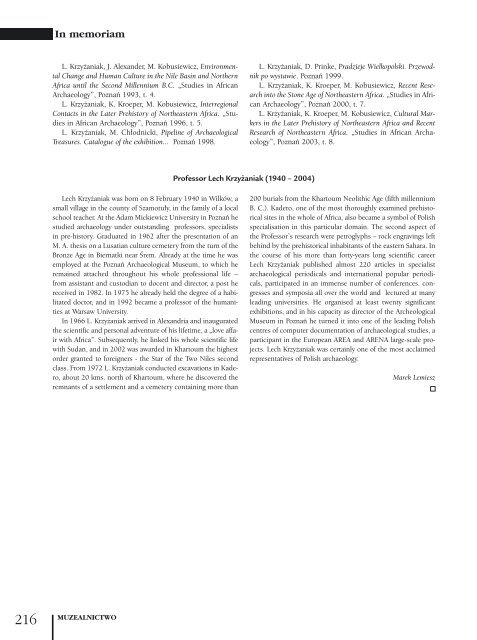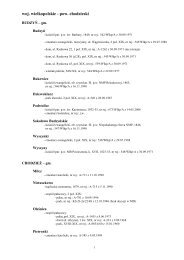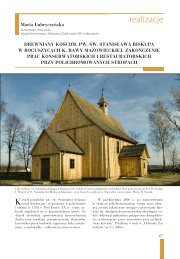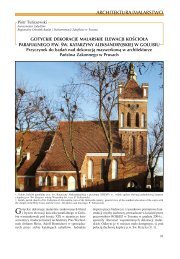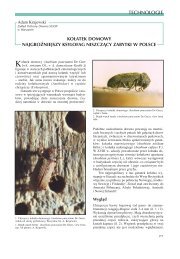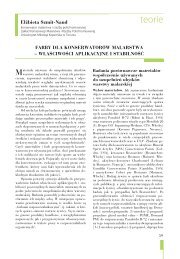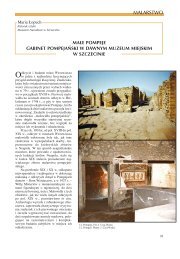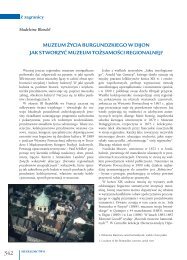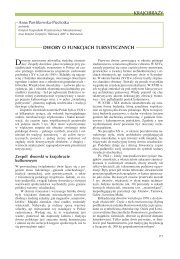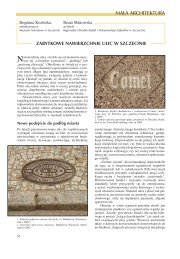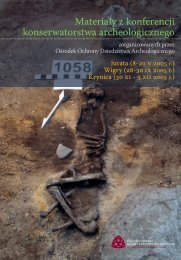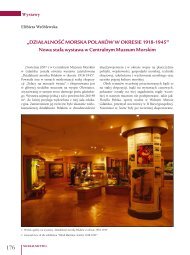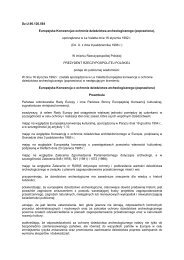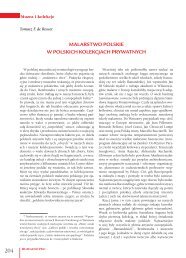Lech Krzyżaniak
Lech Krzyżaniak
Lech Krzyżaniak
Create successful ePaper yourself
Turn your PDF publications into a flip-book with our unique Google optimized e-Paper software.
216<br />
In memoriam<br />
L. <strong>Krzyżaniak</strong>, J. Alexander, M. Kobusiewicz, Environmental<br />
Change and Human Culture in the Nile Basin and Northern<br />
Africa until the Second Millennium B.C. „Studies in African<br />
Archaeology”, Poznań 1993, t. 4.<br />
L. <strong>Krzyżaniak</strong>, K. Kroeper, M. Kobusiewicz, Interregional<br />
Contacts in the Later Prehistory of Northeastern Africa. „Studies<br />
in African Archaeology”, Poznań 1996, t. 5.<br />
L. <strong>Krzyżaniak</strong>, M. Chłodnicki, Pipeline of Archaeological<br />
Treasures. Catalogue of the exhibition... Poznań 1998.<br />
<strong>Lech</strong> <strong>Krzyżaniak</strong> was born on 8 February 1940 in Wilków, a<br />
small village in the county of Szamotuły, in the family of a local<br />
school teacher. At the Adam Mickiewicz University in Poznań he<br />
studied archaeology under outstanding professors, specialists<br />
in pre-history. Graduated in 1962 after the presentation of an<br />
M. A. thesis on a Lusatian culture cemetery from the turn of the<br />
Bronze Age in Biernatki near Śrem. Already at the time he was<br />
employed at the Poznań Archaeological Museum, to which he<br />
remained attached throughout his whole professional life –<br />
from assistant and custodian to docent and director, a post he<br />
received in 1982. In 1975 he already held the degree of a habilitated<br />
doctor, and in 1992 became a professor of the humanities<br />
at Warsaw University.<br />
In 1966 L. <strong>Krzyżaniak</strong> arrived in Alexandria and inaugurated<br />
the scientific and personal adventure of his lifetime, a „love affair<br />
with Africa”. Subsequently, he linked his whole scientific life<br />
with Sudan, and in 2002 was awarded in Khartoum the highest<br />
order granted to foreigners - the Star of the Two Niles second<br />
class. From 1972 L. <strong>Krzyżaniak</strong> conducted excavations in Kadero,<br />
about 20 kms. north of Khartoum, where he discovered the<br />
remnants of a settlement and a cemetery containing more than<br />
MUZEALNICTWO<br />
Professor <strong>Lech</strong> <strong>Krzyżaniak</strong> (1940 – 2004)<br />
L. <strong>Krzyżaniak</strong>, D. Prinke, Pradzieje Wielkopolski. Przewodnik<br />
po wystawie. Poznań 1999.<br />
L. <strong>Krzyżaniak</strong>, K. Kroeper, M. Kobusiewicz, Recent Research<br />
into the Stone Age of Northeastern Africa. „Studies in African<br />
Archaeology”, Poznań 2000, t. 7.<br />
L. <strong>Krzyżaniak</strong>, K. Kroeper, M. Kobusiewicz, Cultural Markers<br />
in the Later Prehistory of Northeastern Africa and Recent<br />
Research of Northeastern Africa. „Studies in African Archaeology”,<br />
Poznań 2003, t. 8.<br />
200 burials from the Khartoum Neolithic Age (fifth millennium<br />
B. C.). Kadero, one of the most thoroughly examined prehistorical<br />
sites in the whole of Africa, also became a symbol of Polish<br />
specialisation in this particular domain. The second aspect of<br />
the Professor’s research were petroglyphs – rock engravings left<br />
behind by the prehistorical inhabitants of the eastern Sahara. In<br />
the course of his more than forty-years long scientific career<br />
<strong>Lech</strong> <strong>Krzyżaniak</strong> published almost 220 articles in specialist<br />
archaeological periodicals and international popular periodicals,<br />
participated in an immense number of conferences. congresses<br />
and symposia all over the world and lectured at many<br />
leading universities. He organised at least twenty significant<br />
exhibitions, and in his capacity as director of the Archeological<br />
Museum in Poznań he turned it into one of the leading Polish<br />
centres of computer documentation of archaeological studies, a<br />
participant in the European AREA and ARENA large-scale projects.<br />
<strong>Lech</strong> <strong>Krzyżaniak</strong> was certainly one of the most acclaimed<br />
representatives of Polish archaeology.<br />
Marek Lemiesz


